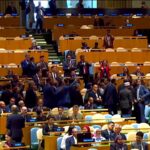Health
Appointments in General Practice, August 2025
Read more on post.
Health
Recommendations announced for influenza vaccine composition for the 2026 southern hemisphere influenza season
Read more on post.
The World Health Organization (WHO) today announced its recommendations for the viral composition of influenza vaccines for use in the 2026 influenza season in the southern hemisphere. The announcement was made at an Information Meeting after a 4-day Consultation on the Composition of Influenza Virus Vaccines.
Given the constantly evolving nature of influenza viruses, regular updates to vaccine composition are essential to ensure their effectiveness and to protect public health worldwide.
WHO convenes these consultations twice annually – once for the southern hemisphere and once for the northern hemisphere, bringing together an advisory group of experts from WHO Collaborating Centres and Essential Regulatory Laboratories. The group reviews surveillance and other data provided by the WHO Global Influenza Surveillance and Response System (GISRS) and collaborators to inform its recommendations.
WHO’s recommendations serve as the basis for national and regional regulatory authorities, pharmaceutical manufacturers, and other stakeholders to develop, produce, and license influenza vaccines for the upcoming season.
WHO recommends that trivalent vaccines for use in the 2026 southern hemisphere influenza season contain the following:
Egg-based vaccines
- an A/Missouri/11/2025 (H1N1)pdm09-like virus;
- an A/Singapore/GP20238/2024 (H3N2)-like virus; and
- a B/Austria/1359417/2021 (B/Victoria lineage)-like virus.
Cell culture-, recombinant protein- or nucleic acid-based vaccines
- an A/Missouri/11/2025 (H1N1)pdm09-like virus;
- an A/Sydney/1359/2024 (H3N2)-like virus; and
- a B/Austria/1359417/2021 (B/Victoria lineage)-like virus
Consistent with the four previous WHO recommendations since September 2023, it remains the opinion of the WHO influenza vaccine composition advisory committee that the inclusion of a B/Yamagata lineage antigen is no longer warranted.
Quadrivalent vaccines, where the transition to trivalent vaccines is not yet complete, contain a 4th component – a B/Yamagata lineage virus (B/Phuket/3073/2013-like virus).
There will no longer be updated recommendations for the B/Yamagata lineage component.
WHO has also updated recommendations for the development of new candidate vaccine viruses for zoonotic influenza, with a view on pandemic preparedness.
Health
Member States advance vital work in support of WHO Pandemic Agreement
Read more on post.
WHO Member States held their second intergovernmental meeting from 15-19 September, to further develop the Pathogens Access and Benefit Sharing (PABS) system, a critical annex to the WHO Pandemic Agreement.
The PABS system aims to enable safe, transparent and accountable access and benefit-sharing for pathogen materials and sequence information, as well as equitable, rapid and timely sharing of vaccines, therapeutics, diagnostics and other resulting benefits.
As part of its adoption of the WHO Pandemic Agreement in May 2025, the World Health Assembly established the open-ended Intergovernmental Working Group (IGWG) to undertake several tasks, including, as a priority, to draft and negotiate the PABS annex to the Agreement.
The Assembly decided that the outcome of the IGWG’s work would be submitted to the Seventy-ninth World Health Assembly in 2026 for consideration.
“Countries have taken the next step in building the platform needed for making the world better prepared and safer in the event of future pandemics,” said Ambassador Tovar da Silva Nunes of Brazil, co-Chairperson of the IGWG Bureau guiding the negotiations. “There is a strong common understanding on critical issues needed to develop a mechanism for Pathogen Access and Benefit Sharing. Negotiators from around the world have made strong progress in shaping this central pillar of the WHO Pandemic Agreement.”
Ambassador da Silva Nunes said the first draft PABS annex was expected to be drafted and negotiated in November and December 2025.
During the IGWG meeting, WHO Director-General Dr Tedros Adhanom Ghebreyesus, congratulated countries for their work to amend the International Health Regulations, which officially entered into force on 19 September 2025, saying this achievement along with the Pandemic Agreement’s historic adoption provided the momentum needed to develop the PABS annex.
“The amendments to the International Health Regulations and the adoption of the Pandemic Agreement by the World Health Assembly this year were truly generational accomplishments,” said Dr Tedros. “Countries now have the opportunity and responsibility to bring the Pandemic Agreement to fruition by finalizing the Pathogen Access and Benefit-Sharing system, as mandated by the World Health Assembly.”
In addition to negotiating the PABS annex, the IGWG was established to conduct preparatory work for the Conference of the Parties to the WHO Pandemic Agreement.
-
Politics3 days ago
European Parliament snubs Orbán with vote to shield Italian MEP from Hungarian arrest
-
Culture3 weeks ago
Life, loss, fame & family – the IFI Documentary Festival in focus
-
Health4 days ago
EU renews support for WHO’s Universal Health Coverage Partnership
-
Environment7 days ago
Key oceans treaty crosses threshold to come into force
-
Culture2 months ago
Fatal, flashy and indecent – the movies of Adrian Lyne revisited
-
Culture3 days ago
Twilight at 20: the many afterlives of Stephenie Meyer’s vampires
-
Culture1 week ago
Farewell, Sundance – how Robert Redford changed cinema forever
-
Culture3 weeks ago
What is KPop Demon Hunters, and why is everyone talking about it?









































